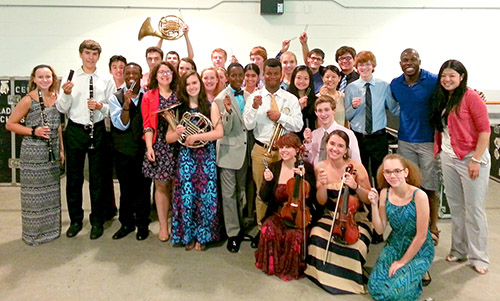Martin Ihrig works with Philadelphia schools and musicians to expand music education opportunities
 Philadelphia has always been a city of great musicians. But financial challenges have chipped away at the system that gave many city students a chance to train and play with world-class talents.
Philadelphia has always been a city of great musicians. But financial challenges have chipped away at the system that gave many city students a chance to train and play with world-class talents.
A new collaboration between the nonprofit Project 440, the Philadelphia Orchestra, the School District of Philadelphia, and the University of Pennsylvania aims to create a new and robust community for the city’s student musicians.
Project 440 brings together professional musicians, including members of the orchestra, to train young musicians. The lessons go far beyond sharps and flats. Students learn teamwork, leadership, communication, and entrepreneurship skills that stay with them throughout life.
“Our students are the epitome of what the 21st century musician should look like,” said Joseph Conyers, Assistant Principal Bass of the Philadelphia Orchestra and Executive Director of Project 440. “They are performers, educators, and social entrepreneurs.”
Martin Ihrig, Practice Professor and Academic Director of GSE’s M.S.Ed. in Education Entrepreneurship, is working with Project 440 to identify what resources are available to student musicians and find new ways to collaborate with the Philadelphia Orchestra, the District, and other players in what he calls the ‘music ecosystem’. In his research, Ihrig studies how organizations create innovation and growth in ecosystems of multiple stakeholders. This includes mapping the critical knowledge assets each organization can leverage for success. In many ways, creating ecosystems of partners working toward similar goals is what Project 440 wants to achieve.
“This project allows us to have a real world impact on the lives of children in Philadelphia and to create social wealth in our community,” said Ihrig.
A simple path used to exist for classical musicians in Philadelphia. Students had access to great music classes in almost every school, and district-wide music programs, Conyers said. The best players in these schools would then often attend the Curtis Institute. After that, elite musicians graduated to chairs in the city’s musical companies. According to Conyers, more than 40 percent of the Philadelphia Orchestra’s players are still Curtis graduates.
“It really was an ecosystem,” Ihrig said. “Musicians grew together and played together through school and up to the Orchestra.”
Music programs in Philadelphia have suffered as the school district has dealt with budget cuts. Conyers hopes Project 440 can fill in voids created by some of the cuts and build a unified musical community in the process.
“Project 440 is working to rebuild that system and take care of our kids and provide a pipeline of great musicians for the city,” Ihrig said.
A first step is Project 440’s involvement with the All City Orchestra. The project is already changing lives, said Aileen Rimando, a classroom music teacher for the district and All City Orchestra committee member.
“This program is an example of how to break social, racial, and economic barriers,” said Rimando. “Our collaboration teaches students cultural lessons in teamwork, patience, and tolerance.”
The collaboration helps students find their voice, added Daniel Berkowitz, the new director of collaborative learning at the Philadelphia Orchestra, chief liaison for external community and education collaborations.
“When students learn an instrument, they have a voice, goals, identity, and a community to strive with together,” Berkowitz said. “The benefits are immeasurable.”
<> <> <>
A spot at SXSWedu
SXSWedu, the annual education conference and festival in Austin, crowd sources its panels through its PanelPicker competition. This year, three projects with Penn GSE ties are on the ballot.
SXSWedu fosters innovation in learning by hosting a diverse and energetic community in education. “We want to get the word out and talk about what we are doing, so that others can learn from our experience” said Ihrig.
A City-Wide Collaboration for Music Education: Ihrig and leaders from Project 440, the Philadelphia Orchestra, and the School District of Philadelphia would discuss their efforts to expand music education. Vote for it here.
Issues Building an Innovative School: Amy Stornaiuolo, professor of Reading, Writing, and Literacy, would participate in a “problem solver” session in which she and leaders from Philadelphia’s U School would discuss how schools can create new models of learning. Vote for it here.
EdTech: Increase Efficiency or Elevate Learning?: Bobbi Kurshan would contribute to a panel with Kanter Learning Design and Research on addressing barriers to and opportunities for designing and implementing products that target innovative teaching practices for active student learning. Vote for it here.
Voting runs through September 4.
